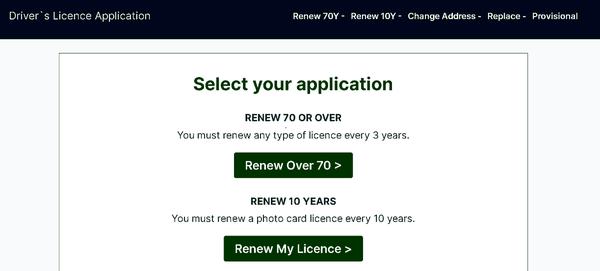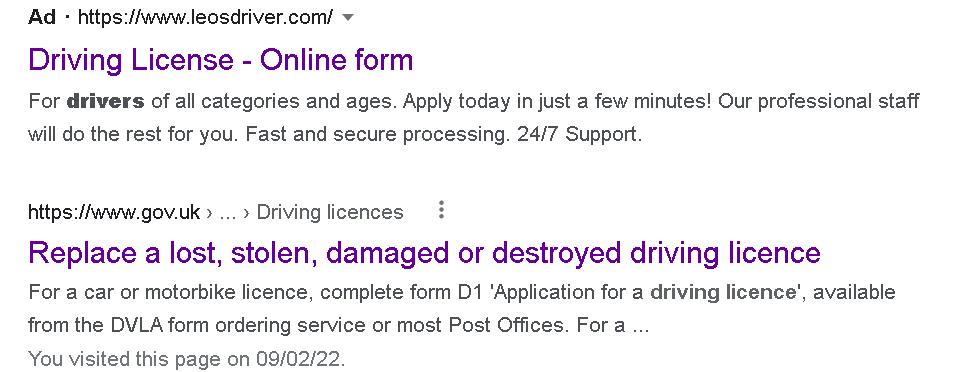
Rip-off firms are using bing and Google ads to attract customers and sell overpriced and unnecessary driving licence renewal services, Which? has found.
In the UK, around 165,000 online searches every month include the phrase ‘driving licence’. We found that almost three quarters of the most common driving licence renewal searches return ads for third-party websites charging £50 to £100 – seven times the official fee – to ‘check’ and renew licences.
These ‘checking’ services aren’t offered by the DVLA, but there is little difference between the official DVLA renewal process and those of unaffiliated sites that offer these services.
In many cases, these sites use the same processing methods people would use with the DVLA and offer a poor value for money for ‘checking’ services that you don’t need.
Unaffiliated third-party DVLA sites are still appearing in Bing and Google search ads despite breaching their policies.
Here, we explain how frequently the ads appear for driving licence renewal searches, how to avoid them and how to get your money back.
We spent two weeks searching the same five common driving licence-related terms on Google and Bing to analyse how many third-party websites appeared in search ads above the DVLA result. We found that 73% of searches returned one or more of these types of ads.
Eight third-party ads appeared on a single search on Bing for ‘how to renew a driving licence’, all charging at least double the DVLA rate for ‘checking’ and renewal.
On Google, eight ads appeared for the search ‘renew driving licence at 70’. All adverts dominated top search results and charged £50 for renewal for those aged over 70 – even though it’s free from the DVLA.
One prolific site, optionalcheckingservice.co.uk, charges a £69 ‘checking fee’ for filling out an online renewal form. It then posts the form to you, for you to send to the DVLA yourself.
| Third-party licence ‘checking’ and renewal site | Third-party cost | DVLA renewal cost |
| onlinevehicleservices.co.uk | £94 | £14 |
| applylicence.plus | £79.50 | £14 |
| drivinglicencerenewalsonline.co.uk | £50 | £14 |
| Table notes: drivinglicencerenewalsonline.co.uk uses an insecure HTTP protocol at the start of the URL. HTTP protocols are not as secure as HTTPS. Always be on the lookout for the right protection when using an unknown website. |
Two websites we found looked and felt extremely similar to the DVLA government website and could easily be mistaken for it – which is an unlawful scam.
We reported these websites to the National Cyber Security Centre and both have been taken down.
Ads for driving licence services from companies unaffiliated with the DVLA can mislead drivers of all ages. Ads regularly appear in searches for both ‘provisional driving licences’ and ‘renew licence at 70’.
The owner of a driving school in Liverpool told us that his pupils have been caught out by unscrupulous ads, saying ‘these third party companies are handling personal data and over-charging, often adding little to no value … pupils who have used these websites are often upset at overpaying for services and are concerned about their personal data’.

If you’re worried about a website or business holding your personal information, you can send them a Subject Access Request.
This is a request for a copy of all personal data that an organisation holds on you. You may also be able to request that your personal data is deleted by submitting a separate request for deletion to the organisation.
A DVLA spokesperson told us: ‘While the majority of government services are free on gov.uk we’re aware that some third-party sites charge a premium. Such sites are not affiliated with DVLA in any way.
‘If we believe a website is operating outside the advertising guidelines we inform the relevant enforcement and controlling bodies.’
A customer of a ‘checking’ firm, ukapplydrivinglicence.co.uk paid £50 to renew his licence, but soon realised that he could have paid less. When he tried to contact the firm to stop the service and get a refund, the supposed phone number belonged to the DVLA and its ‘24/7’ online contact form didn’t work.
Eventually getting a response, the company said: ‘We’re unable to cancel your application or provide any form of refund because your application has already been processed’.
The company never sent confirmation of the application, instead letting the DVLA send out an automated email six hours later informing them they had received it.
Our contact added that ‘given the confirmation from the DVLA … it seems the “company” just forward the application and pocketed £50 for the privilege’.
Many of these sites decline refunds stating that starting the service means they can’t reimburse the money. Our case study got their new licence, but others haven’t been as lucky.
We also found six third-party websites being run from the same address in London by a company called Call Services Ltd. The address is used as a registered office service used for forwarding mail. When we contacted Call Services Ltd, no one responded.
Bing and Google both published ads policies in 2020 forbidding ‘ads for documents and services that can be obtained from a government or a delegated provider. This includes offers of assistance to obtain these products’.
When we reported the ads for third-party websites to Google, it said: ‘We have strict policies that govern the types of ads and advertisers we allow on our platforms. We only allow governments or their delegated providers to advertise for official documents or services.’
Search engines have been promising action on these kinds of websites since 2014, but still depend heavily on the public to report misleading ads.
Which? believes this is only part of the approach needed and online platforms should be legally required to identify, remove and prevent fake and fraudulent content such as misleading adverts.
Reporting tools should also be made easier and businesses advertising on search engines should be verified before ads go live.
In response to our findings, Bing said advertisers ‘must ensure they comply with all applicable local laws and regulatory requirements. We encourage people to report possible deceptive or fraudulent ads so we can review and take action as appropriate’.
Bing also blocked all the URLs we sent to them for breaching its search ad policies.
If you’ve lost money to misleading adverts or websites, there are steps you can take to get your money back if you paid by credit or debit card. You can make a Section 75 claim to your bank or credit card provider if the amount is more than £100, or a chargeback claim for amounts of less than £100.
If an advert is suspicious you should report it to the platform that’s hosting it. You can also report them to Action Fraud and Trading Standards. If you’re in Scotland you can report misleading ads by phoning 101.
Third-party websites charge a premium for renewing official driving licences that should only cost £14. The service is free if you’re over the age of 70, and changing an address is also free.
For those starting out on the road, provisional licences officially cost £34 from the DVLA.
Read our guide on how to spot a copycat website to make sure you aren’t caught out.